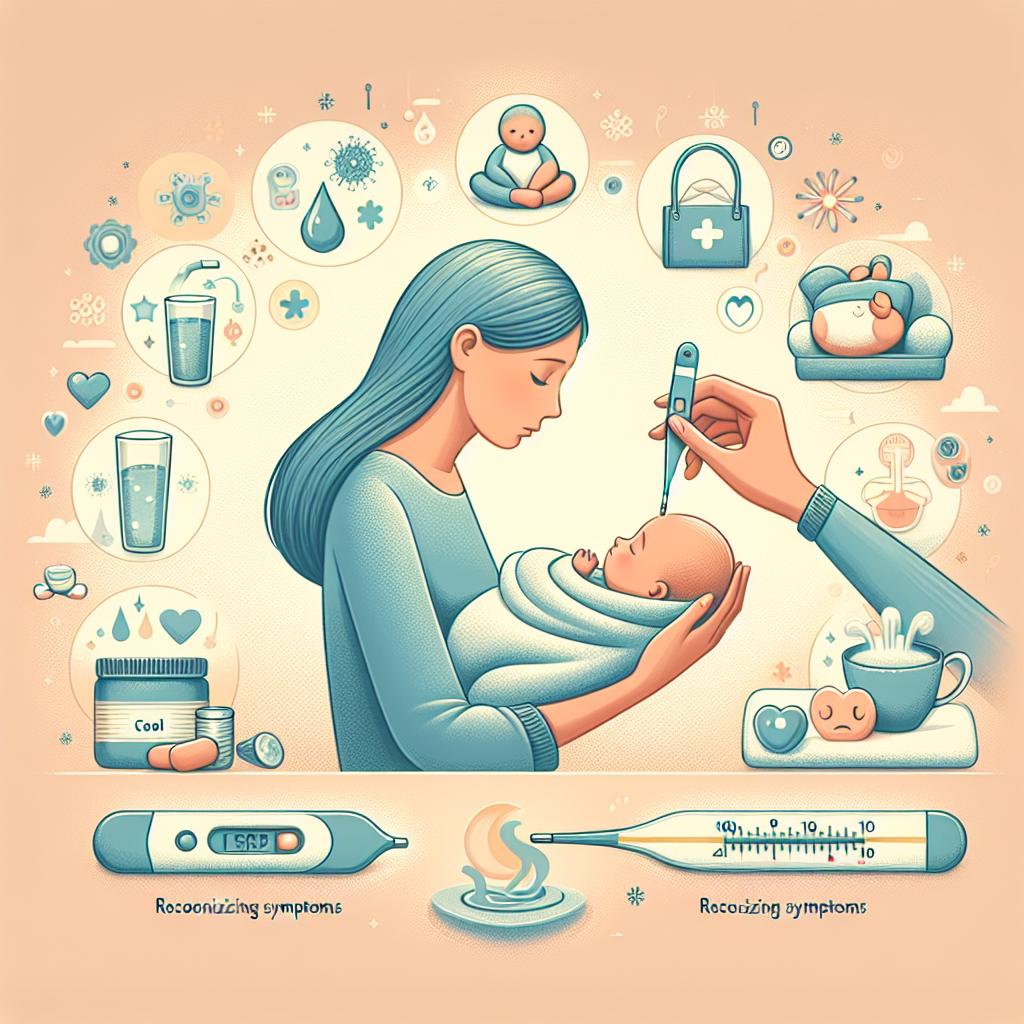Recognizing the Symptoms of Baby Fever
As parents, it’s stressful when your baby is unwell. A fever can sometimes be the first sign that something is not right. We’re here to help you understand the symptoms and provide some comforting techniques to manage your baby’s first fever.
What is Baby Fever?
In simple terms, a fever is an increase in body temperature often triggered by the body fighting off viruses or bacteria. According to Nationwide Children’s Hospital, a normal temperature for a baby is around 97.5°F (36.4°C). Anything above 100.4°F (38°C) is considered a fever. But fever in itself isn’t an illness; rather, it’s a symptom of an underlying condition.
Recognizing Fever Symptoms in Babies
Before panicking and assuming your baby has a fever, it’s crucial to know the symptoms. Here are some signs to look out for:
- Irritability: Your baby might appear more fussy than usual and show signs of discomfort.
- Changes in Sleep Patterns: They might sleep more than usual or have difficulty sleeping.
- Changes in Eating Habits: Your baby may lose their appetite or want to feed more often.
- Changes in Behavior: They might be less active, seem tired or uninterested in play.
Note that these signs could also indicate teething. So, distinguishing between teething and fever symptoms is crucial for effective treatment.
Treating Baby Fever: Techniques That Work
Managing baby fever can be challenging, but there are several methods you can use to help your little one feel better. These include:
- Hydration: Ensuring your baby is well-hydrated is paramount. More fluids will help cool down their body and prevent dehydration.
- Rest: Like adults, babies recover faster when they get enough sleep. Help them rest in a quiet, dimly lit room.
- Fever Reducing Medication: Consult your pediatrician before giving any medication. They might recommend specific doses of Acetaminophen or Ibuprofen to reduce the fever.
Please remember, if your baby’s fever lasts for more than a few days or other concerning symptoms arise, consult a health professional immediately. UC Davis Health and GoHealth Urgent Care provide excellent resources on how to handle fevers in children.
Finally, while managing your baby’s first fever can be nerve-wracking, remember that a fever is the body’s way of fighting infection. Gaining knowledge about recognizing symptoms and treatment techniques can help you navigate these challenging times with confidence. Our experiences navigating outdoor activitiesand craft activities or joining parent-child playgroups have shown us that knowledge is power when it comes to parenting. Stay tuned as we continue exploring this topic….
Recognizing the Symptom of High Fever
Sometimes, it’s evident that your baby has a high fever due to excessive sweating, hot skin, and red cheeks. A rectal thermometer can accurately measure the temperature. However, a high fever shouldn’t be ignored – it may indicate a severe illness, mandating immediate medical advice. Tips from Tylenol can help to break this fever, although, it’s imperative to seek professional help.
Refusal to Take Medicine
Administering medicine can be a struggle since babies often reject medication due to its unfamiliar taste. Approaches from Seattle Children’s Hospital can guide you on how to gently and successfully give medication to your baby.
What is a Febrile Seizure?
Although rare, a high fever can sometimes cause a febrile seizure in your baby, which may make them lose consciousness, twitch, or have full-blown seizures. It tends to be harmless and only happens once, but it’s frightening and requires immediate medical attention.
When to Seek Emergency Medical Help?
Fever can sometimes escalate into a potential emergency. Remember to seek professional assistance immediately if your baby experiences breathing difficulties, constant vomiting, increased irritability, or any form of seizures. John Hopkins Medicine is a useful resource to understand when to intersperse between an urgent care or emergency room visit. It provides great tips on recognising situations that demand instant medical intervention.
Gut Health and Fever
Another aspect that is often overlooked is the role of gut health tied to the immune system. A healthy gut is essentially linked to a strong immune system that can efficiently fight off infections and maintain a healthy body temperature. Including probiotics and a balanced diet in the baby’s feeding routine can support good gut health.
Baby Fever Myths: Debunking Old Wives’ Tales
Many myths exist regarding baby fever. These myths often mislead worried parents, causing unnecessary panic or danger to the baby’s health. For example, it’s widely believed that teething causes fever. However, according to WebMD, teething does not technically cause a fever or any illness but it might marginally increase the baby’s body temperature.
One significant belief is that fevers cause brain damage or blindness. However, normal fevers that typically accompany illnesses are not high enough to cause this. Extremely high temperatures, like that seen in heatstroke, can be potentially dangerous. Redirect any misconceptions about fevers by responsibly following medical advice and reliance on informed decisions over myths.
Having your baby experience their first fever can indeed be a daunting situation. But with the right information and approach, you can efficiently manage the situation, ensuring the well-being of your little one. Do watch out for more informative discussions as we continue to explore various aspects of parenting and child care.

